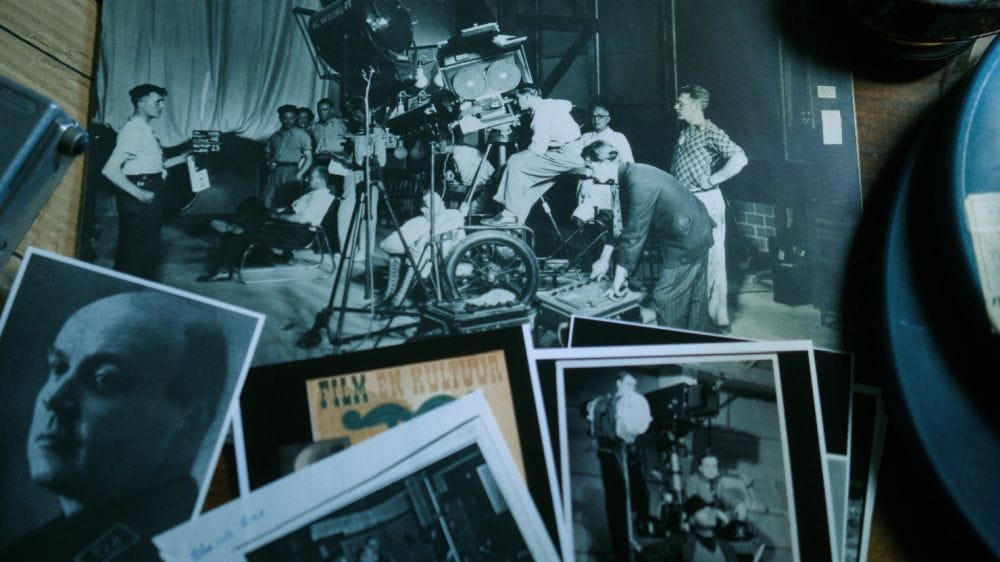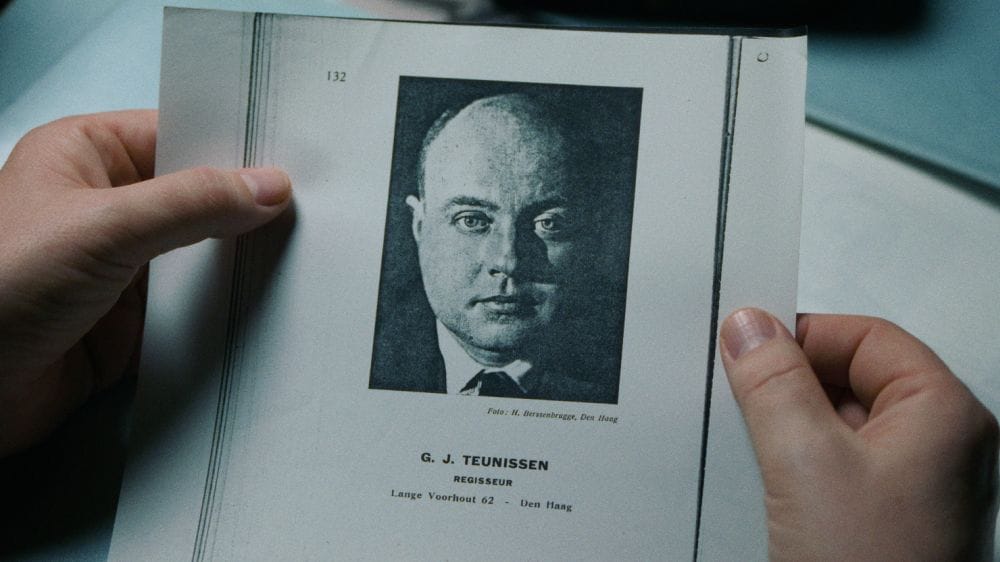The Propagandist (dir. Luuk Bouwman)

It’s probably not coincidental that there are multiple documentaries releasing this year that deal with WWII propaganda. Andres Veiel’s Riefenstahl premiered a year ago at last year’s Venice Film Festival and Luuk Bouwman’s The Propagandist premiered at the International Film Festival Rotterdam, also last year. Both documentaries share a lot of narrative similarities. Which probably isn't surprising given their subjects, Leni Riefenstahl and the lesser known Dutch Nazi Party member Jan Teunissen respectively, are very similar people. If 80 years have taught us anything it’s that all too much of these stories are photocopies from the same genocidal playbook.
I had my issues with the craft of Veiel’s documentary (particularly the perplexing editing choices). The version of The Propagandist that I viewed was about 20-minutes shorter than its runtime at time of premiere, so maybe they’ve tinkered with this one in a way since it first screened like I think that one should have been. Whatever the case may be, I found Bouwman’s film to be quite impressive and the better of the two. Told through audio recordings with Teunissen and other crew-members of his Dutch Nazi Party Film Service, recorded in 1964 and ‘65 by now-93-year-old archivist Rolf Schuursma and later by Egbert Barten in an effort to record the stories of the lesser-known Nazi propaganda unit of Holland following the German invasion. Utilising video and photography of Teunissen and his sets, film clips and behind the scenes footage, interspersed with additional (visually conflicting and somewhat off-putting) black-and-white shots that have little to do with anything, The Propagandist is aided by a strong musical score comprised of lush string compositions by Mathilde Wantenaar, and strong editing.
He was obsessed with the idea, and became a Nazi to achieve it—all while claiming to not be “anti-Jewish” yet working for an agency that wouldn’t allow Jewish technicians on set or anybody who wasn’t a Nazi Party member to make films. A most definitely narcissistic decision.
Of course, yes, the story is one we’ve heard before. Jan Teunissen was a Dutch filmmaker who set his sites on igniting his homeland’s film industry. Initially with a well-intentioned by critically maligned (savagely so) period drama, William of Orange in 1934, and then once again as the head of the Dutch Nazi Party Film Service upon his joining of the Dutch Nazi Party. He and his wife ummed and aahed, but ultimately it behoved them to do so for the betterment of their lives and his career (he would eventually also join the SS; he was an opportunist, you see). He very proudly calls his works propaganda with narrative arcs that he explains start subtly and eventually hammer its nationalist-socialist messages home (even as mundane subjects as superior Dutch cows). Telling of the need to inform “the masses” and of their “ignorance”, plus the lengths he went to to present party leader Mussert as anything but the bumbler that he apparently was. While they were already producing newsreels and propaganda, it’s fair to say that upon Teunissen’s arrival, this significantly escalated. He would quickly become the Film Service’s head among other significant propaganda roles for which he would label himself “the film czar”.
“He just looked normal. He didn’t look like a fascist”, they say. Again, heard it all before. Teunissen was steadfast in his single-minded vision, seeing this space as a way to simply build a career in film that he had always wanted. A peculiar defence that is repeated in the recorded interviews with him as well as his colleagues like Reiner Meijer, Bob Kommer and cameraman Jan Koelinger. He was obsessed with the idea, and became a Nazi to achieve it—all while claiming to not be “anti-Jewish” yet working for an agency that wouldn’t allow Jewish technicians on set or anybody who wasn’t a Nazi Party member to make films. A most definitely narcissistic decision. Even if he (apparently) did not really have much affection for the Nazi messaging that he was propagating, he propagated it nonetheless. He took directions from Goebbels! And through The Propagandist we hear Teunissen defend himself this way, much as Reifenstahl did for decades—although she went further to claim she was blind to everything that was happening and wasn’t even a party member (something that Veier’s Reifenstahl does a good job of showing was obviously delusional).

In some of its more interesting passages, Bouwman’s film focuses on the filmmaking itself and the way Teunissen was changed and how deluded he must have become. Like how he admits to attempting to censor art critics in the country, even using heat torture on them (leaving them in a “sweatbox” as he describes it on tape) before offering a lecture on how “criticism is a wonderful thing, but we can’t have deliberately destructive criticism.” Later, we learn of the disappearing of a big-budget animated feature (the Netherlands’ first), Of Reynard the Fox. His work on Sabbath, a (supposed) sympathetic take on the country’s Jewish quarter was later repurposed for the infamous The Eternal Jew, a despicable piece of propaganda that he calls an “unfortunate” moment. Like Riefenstahl and others before and after him, this all sounds like very Nazi-like behaviour for a man who claims he was not one. I’d also love a documentary all its own about the CS-6 resistance, who are briefly discussed here for their role in the bombing of the Rembrandt Cinema as a violent warning to audiences who were flocking to cinemas to watch Nazi propaganda.
Does The Propagandist, or Riefenstahl for that matter, have anything to really add to the discussion today? Significantly, it would be to remind us that these people used to have some shame. That the legacy of state-sponsored sycophancy was one to hide in the shadows and hope nobody brings up in polite society like Teunissen and his collaborators. Or like Riefenstahl, who spent her entire career running away from the allegations only to have plenty of her own material to support them. We now live in a time where political messaging machines such as these are right out there on prime time being promoted by leaders and politicians as if they are state-owned propaganda offices. There’s very little difference to Nazi propaganda and any of the mainstream media outlets doing the public bidding of Israel, scaring seemingly smart journalists all over the world into refusing to call a spade a genocide or even call out the murder of journalists like themselves. Or the Fox News, Newsmax, RT, Xinhua News Agency and Sky News Australias of the world promoting fascist, nationalistic and deliberately divisive ‘news’ to braying, drooling audiences who billionaires and their wannabe-billionaire politician servants conveniently need to distract. It’s all a page out of the same book. In the case of The Propagandist, its well made and another part of a puzzle that should warn people of where these things inevitably lead.
If you would like to support documentary and non-fiction film criticism, please consider donating by clicking the above link. Any help allows me to continue to do this, supports independent writing that is free of Artificial Intelligence, and is done purely for the love of it.



